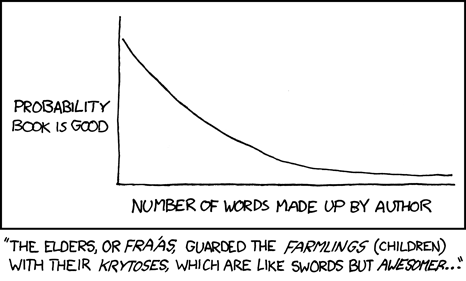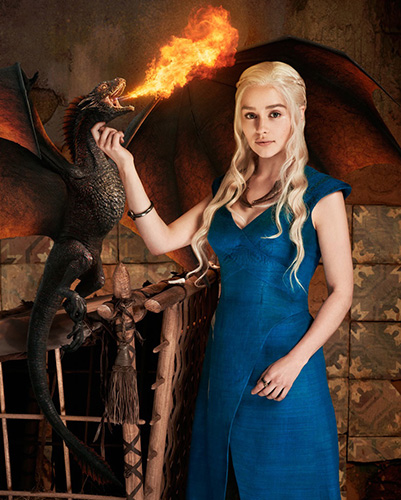A Bitch by Any Other Name…
So, it’s Thursday and I’m still thinking about Sunday’s Game of Thrones episode. Without going into spoiler-level details, there’s a great scene with Daenerys Targaryen. How good is it? Well, I almost went online and bought a Targaryen house tee-shirt.
But I’m not here today to advertise for HBO. I’ve been thinking about language, culture and translation in fantasy. For three or so episodes now, there’s been a salesman referring to Daenerys as a “bitch” and a “Westerosi whore.” But I wasn’t thinking about the “whore” crack, despite the included assumptions that the speaker’s culture has a paid sex trade that is held in poor esteem and not, for example, a form of divine service. No, I kept coming back to the word “bitch.”
I could not recall seeing dogs in the background of the city where this salesman lived. He never referred to people from Westeros as dogs. And yet, the subtitles told me that the man’s preferred term of opprobrium for Daenerys was to call her a female dog.
Mind you, ‘bitch’ is a word with a long and storied history … here in the United States. I’m sure it owes its development to use in Europe as well. But this story doesn’t take place in the United States, nor Europe, nor anywhere in our world. And yet, there was the word, used the same way it would see colloquial use here (not necessarily the way it’s used in rap, but that’s a whole different post).
I found myself thinking about a character I play in a Runequest game, a hunter. For this character, dogs hold a prominent cultural place. These human beings communicate as easily and clearly with their dogs as they do with each other. Brother Dog is one of their gods. In Balazar (this hunter’s homeland) if a woman were called a bitch, the speaker would be paying a great compliment to her hunting skills. In fact, since most of their hunters are men, “bitch” might be the Balazari term for a female hunter, but you better believe it wouldn’t be an insult.
So, back to the world of A Song of Ice and Fire. The salesman called Daenerys a bitch.
Or did he?
Now we bump up against translation issues in fantasy stories. It could be that the term the salesman spoke was some local insult of about the same magnitude as our modern word ‘bitch.’ Thus, in translation on the screen for a modern English-speaking audience, the word read ‘bitch.’
But that excludes the option of adding a little more world-building by telling the audience the local insult, perhaps giving it context for their understanding. True. But would that add to the story or would it just be a pointless distraction?
I remember a Sopranos episode when the mob guy Christopher gets to watch Jon Favreau film a scene involving Janeane Garofalo and Sandra Bernhard. One is supposed to call the other a bitch, and she stops the scene because ‘bitch’ isn’t an interesting enough word. Christopher suggests the Italian word ‘pucchiaca’ instead. That works when you have multiple real languages and reference points. But in a novel, the writer has only what the reader will consent to sit through, which means everything needs to move the story along or fall by the wayside.
A rabbit is a rabbit, whether you call it a rabbit or a smeerp. Of course, it can be argued that a smeerp is a smeerp too, and shouldn’t be confused with a rabbit. The way I look at it, if there’s something significant about smeerps in the story that the reader needs to know, then make them smeerps. Otherwise, they might as well be rabbits.
In the same way, the salesman could have called Daenerys something else, but unless that something else would be important later, he might as well just call her a bitch.
He couldn’t call her a smeerp, of course. That would just be silly.
We know where XKCD stands on the issue.

What do you think? Is ‘bitch’ a good enough word to show up in translation in a fantasy story or would it disappoint you?


